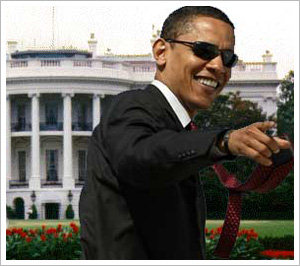White House "beer summit" aims to quench racial flap
 Washington - Barack Obama met with an African-American Harvard professor and the white policeman who arrested him for a round of tension-cooling beers on the White House lawn, hoping to repent for his first racial controversy as US president.
Washington - Barack Obama met with an African-American Harvard professor and the white policeman who arrested him for a round of tension-cooling beers on the White House lawn, hoping to repent for his first racial controversy as US president.
In what has been dubbed the "beer summit," Obama held a private meeting on the muggy Thursday evening near the White House Rose Garden with Professor Henry Louis Gates Jr and Sergeant James Crowley of the Cambridge, Massachusetts, Police Department.
Obama, who inflamed tensions last week with his own comments blaming police for arresting Gates in his own home, tried to play down the gathering's significance beforehand, saying that it was not a "summit" but just "three folks having a drink at the end of the day."
News cameras has telephoto lenses fixed on the round white table starting an hour before the meeting, a sign of how the event dominated US airwaves for days, down to what beers each man would be drinking.
Ever the politician, Obama in shirtsleeves had a Bud Light, the top-selling beer in the US. Gates chose Jamaican beer Red Stripe and Crowley picked Blue Moon, a Belgian-style wheat ale.
According to brief video footage, the two visitors wore dark jackets and ties, and appeared to be engaged in energetic discussion. Obama and Vice President Joe Biden, who had joined the three drinking something non-alcoholic, munched on snacks and largely listened.
Asked afterwards what Obama had contributed to the discussion, Crowley quipped: "The beer."
"He contributed in a small part, but he really wanted to bring two people together to solve an issue," Crowley told reporters.
Crowley indicated that he and Gates were "two gentlemen who agreed to disagree on a particular subject" and were intent on moving "the whole country beyond" the dispute over Gates' arrest. He said the discussion was "cordial and productive."
Gates was arrested July 16 at his home. Returning from a trip to China, the professor and his taxi driver forced open his front door, which had become stuck. Crowley appeared on the scene after a neighbour called the police, suspecting a break-in.
Though Gates showed identification, a verbal confrontation with Crowley ensued and Gates was ultimately arrested for "disorderly conduct." The charges were later dropped.
Obama, the country's first African-American president, catapulted the incident into a national spectacle a week later. He declared at a press conference July 22 that the Cambridge police "acted stupidly" in arresting Gates, a prominent historian who is a long-time friend of Obama.
Police unions demanded an apology, and Obama once again appeared before the cameras two days later. He said he could have "calibrated" his words differently but stopped short of an apology. He accepted Crowley's suggestion of a round of beers together with Gates to ease the tensions.
Crowley said that "no one apologized" during the meeting. He said all agreed to "move forward" and that he and Gates intended to continue their dialogue, probably over "koolaid or ice tea" so as not to send a wrong message about beer drinking. A lone protestor in front of the White House condemned the event for sending a wrong image about alcohol.
Gates left without speaking to the press.
The two men and their families toured the White House before the meeting. When they encountered each other on the tours, they introduced themselves and continued on as a group, Crowley said.
In a statement afterwards, Obama said that Gates and Crowley had "spent some time together listening to one another" before he joined them, "which is a testament to them."
"I have always believed that what brings us together is stronger than what pulls us apart," Obama said.
The arrest and Obama's comments have sparked an ongoing debate about racial profiling by police in the United States. Obama has said it shows that racism "still haunts us."
Since announcing his historic candidacy for president in 2007, Obama had been careful to avoid making his race an issue, effectively campaigning as a post-racial president.
Controversy did spill over in early 2008 over the perceived anti- white and anti-American remarks of his Chicago pastor, the Reverend Jeremiah Wright. (dpa)